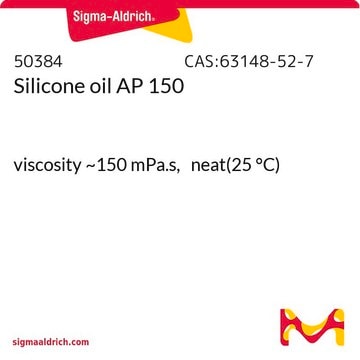378364
Silicone oil
viscosity 100 cSt (25 °C)
Synonym(s):
Dimethylsilcone fluid, Poly(dimethylsiloxane)
About This Item
Recommended Products
vapor density
>1 (vs air)
vapor pressure
<5 mmHg ( 25 °C)
5 mmHg ( 20 °C)
form
viscous liquid
refractive index
n20/D 1.403 (lit.)
viscosity
100 cSt(25 °C)
bp
>140 °C/0.002 mmHg (lit.)
density
0.96 g/mL at 25 °C
Looking for similar products? Visit Product Comparison Guide
Related Categories
General description
Application
Storage Class Code
10 - Combustible liquids
WGK
WGK 1
Flash Point(F)
214.0 °F - closed cup
Flash Point(C)
101.1 °C - closed cup
Personal Protective Equipment
Certificates of Analysis (COA)
Search for Certificates of Analysis (COA) by entering the products Lot/Batch Number. Lot and Batch Numbers can be found on a product’s label following the words ‘Lot’ or ‘Batch’.
Already Own This Product?
Find documentation for the products that you have recently purchased in the Document Library.
Customers Also Viewed
Our team of scientists has experience in all areas of research including Life Science, Material Science, Chemical Synthesis, Chromatography, Analytical and many others.
Contact Technical Service




